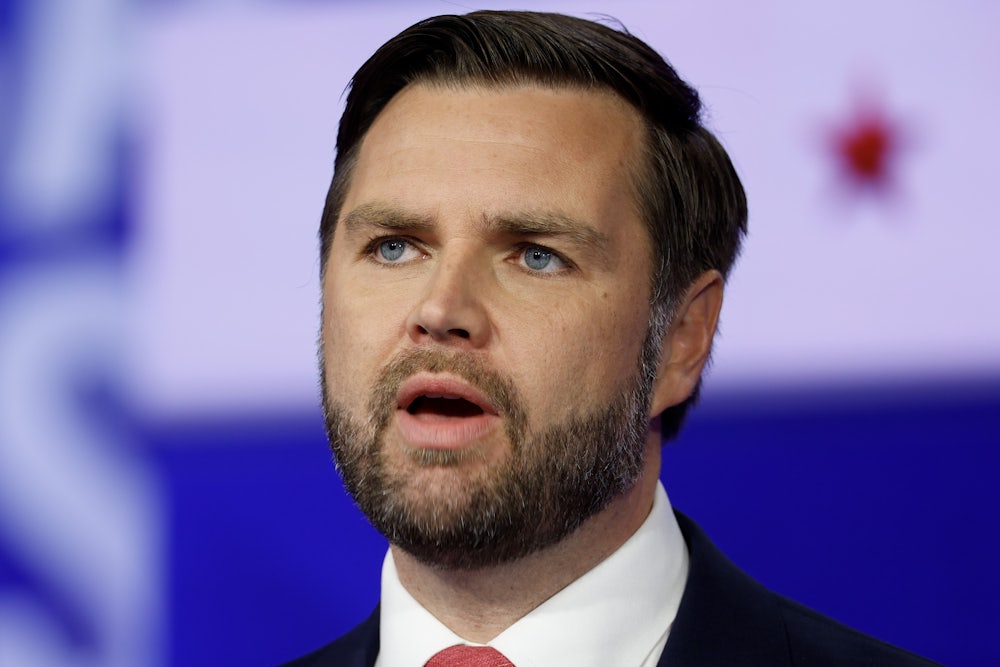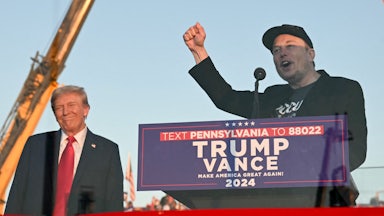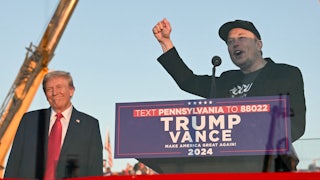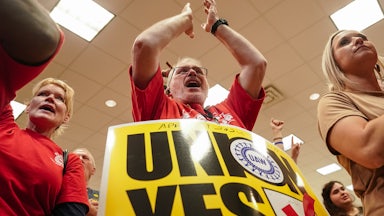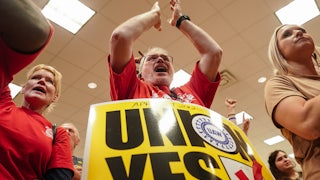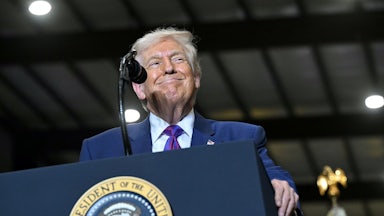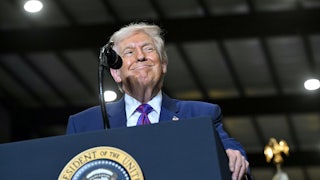During JD Vance’s appearance in Michigan on Tuesday, several members of the audience came dressed rather conspicuously, sporting T-shirts that read “Auto Workers for Trump.” But when Craig Mauger of The Detroit News interviewed them, he learned something interesting: Six of the people wearing those T-shirts were not autoworkers at all.
That’s amusing enough in its own way. But you can spot an even flimsier facade if you consider the actual policy arguments that Donald Trump and Vance are making to autoworkers about the future of their industry. That facade is so Potemkin-like that it gives Democrats an opportunity to put them on the defensive on an issue involving working-class economics—if Harris’s allies are wise enough to seize on it.
In recent days, The Detroit News has persistently questioned Vance about his opposition to the Biden administration’s investments in the green energy transition, which have resulted in a $500 million grant to convert a manufacturing plant in Lansing that makes traditional cars to one that produces electric vehicles. Again and again, the paper reports, Vance has refused to say whether a Trump-Vance administration would honor that investment in Michigan’s future.
“So neither me nor President Trump has ever said that we want to take any money that’s going to Michigan autoworkers out of the state of Michigan,” Vance told the paper in his latest version of this evasion. “We certainly want to invest in Michigan autoworkers as much as possible.”
Vance added that these Biden investments are giving workers mere “table scraps,” while insisting the E.V. transition is sending jobs to China. Democrats have blasted Vance for sneering at the Lansing grant, given that it is expected to preserve 700 jobs in Michigan.
But what’s even more controversial—or should be, anyway—is that Vance is dissembling wildly about his and Trump’s broader intentions toward autoworkers in Michigan, the Rust Belt, and beyond.
Vance claimed that he and Trump will not “take any money that’s going to Michigan autoworkers.” This slippery formulation is designed to deceive. Under the Inflation Reduction Act, or IRA, money isn’t handed directly to workers at manufacturing plants that come or remain online due to its investments. But the money is creating huge numbers of jobs for workers just like them.
That’s because the IRA is pumping hundreds of billions of dollars into tax credits, loans, and grants designed to spur the manufacture and consumption of many green technologies. Those supports are resulting in dozens of projects that are creating roughly a hundred thousand new jobs across the country, largely in clean energy manufacturing—and the Lansing project is one of them. Many of these jobs are in congressional districts represented by Republicans.
Trump has said explicitly that if elected, he would “impose an immediate moratorium on all new spending grants and giveaways” under the IRA and other Biden policies. Again and again, he has vowed to end the “green new scam,” which is Trump’s dumb shorthand for those policies.
Repeal of the IRA simply would result in the cancellation of untold numbers of green manufacturing jobs, including a whole lot of jobs in Rust Belt states, Michigan included. It’s hard to estimate exactly how many, because grants and tax credits that have already been awarded would probably survive repeal. But most of the hundreds of billions of dollars of this money has not yet been spent or even allotted, and a significant portion of these funds would indeed get nixed if the IRA is repealed, says Jesse Jenkins, a Princeton professor who closely tracks IRA implementation.
“The vast majority of the money is still vulnerable to repeal,” Jenkins told me. “That would cause cancellation of dozens of projects across the country that will employ tens of thousands of people at manufacturing jobs just like those at the Lansing plant.”
When Vance says that neither he nor Trump has said they’d take money directly from Michigan autoworkers or take money out of Michigan, it’s sleazy rhetorical subterfuge. He and Trump are running on a platform that would nix untold numbers of manufacturing jobs in the Rust Belt—exactly the sort of jobs that Vance regularly rhapsodizes about as the foundation of a virtuous working-class life in the heartland.
Vance justifies this stance by claiming that the E.V. transition is sending many jobs to China, which controls much of the E.V. manufacturing supply chain. But that too is misdirection: The IRA contains many provisions ensuring that more E.V. parts are manufactured in the United States. Indeed, the whole point of it is to help the U.S. better compete with China in such manufacturing, on the understanding that the world is moving toward E.V.s and the U.S. shouldn’t cede that industry to China.
But ceding the industry to China is exactly what Vance and Trump would do. The idea that autoworkers’ futures can only be secured by maintaining our attachment to fossil fuel industries is a particularly cynical scam, because the opposite is arguably the case. As Robinson Meyer details, if we don’t adapt to the inevitable transition to E.V.s, “American automakers’ markets will continue to shrink” globally, and in that regard, “a Trump victory will cement that defeat.”
Vance has no genuine answer to all this other than vacuous demagoguery about the IRA and China, which trades on cultural signaling to frighten autoworkers and their dependents into believing that elite Democrats are out to destroy their way of life. But why can’t these sorts of green manufacturing jobs of the future—the ones that Democratic policies are creating—constitute the foundation for the pious working-class existence he and his intellectual defenders envision? They can’t answer this question.
There is a tendency among some Democrats to see anything that awakens certain working-class cultural sensitivities—such as talking about transitioning livelihoods away from fossil fuels—as politically perilous and to be avoided. That’s an understandable concern. But this whole saga reveals something telling about the Trump-Vance pitch to these same voters: that when Vance faces tough questioning about the Trump-Vance agenda—and the impact it would have on the future of auto manufacturing in the Rust Belt—he has nothing to offer but dissembling and evasions. Not to mention events held against a backdrop of “Auto Workers for Trump” T-shirts that don’t even contain autoworkers inside them.
Democrats can find ways to press this issue harder without getting caught up in the cultural trap that Republicans have constructed. That the Trump agenda would scrap untold numbers of the manufacturing jobs of the future—and cede E.V. competition to China—should have Trump and Vance permanently on the defensive. And Democrats should do what it takes to keep them there.
